Herman Witsius Collection (11 vols.)
Digital Logos Edition
Overview
Herman Witsius, Dutch theologian, pastor, and professor of the seventeenth century, was a major proponent of covenant theology, and in this 11-volume collection, his greatest works on grace, law, sin, and holiness are collected. Witsius was most famous for The Economy of the Covenants Between God and Man, a systematic exploration of Old Testament law, New Testament grace, the grace of God in both covenants, and how Christ fulfills each covenant. It is included in this collection, as well as his commentary on the Apostles’ Creed and a volume on the authorship of the Pentateuch. The final title, Conciliatory or Irenical Animadversions on the Controversies Agitated in Britain, explores godliness, law, grace, and the role of the believer. Witsius’ work is characterized by careful regard for Scripture and a desire to reconcile different denominations.
During his lifetime, Witsius was a major influence on his contemporaries, such as John Gill and John Owen, and he continues to inspire Christians today, including J. I. Packer. For anyone interested in basic Christian theology or exploring different doctrines of the Christian faith, the writings of Witsius are essential. With the Logos edition of the Herman Witsius Collection (11 Vols.) is easy to read and incorporate right into your studies. Every Scripture reference is linked to the Bibles in your library.
This title is included in the following collections
You can save when you purchase this product as part of a collection.
Logos 6 Reformed Gold Legacy L...
$849.99$849.99Logos 5 Reformed Gold Legacy L...
$849.99$849.99Logos 6 Reformed Platinum Lega...
$1,499.99$1,499.99Logos 5 Reformed Platinum Lega...
$1,499.99$1,499.99
- $2,999.99
- $2,999.99
- $2,999.99
- $4,749.99$3,562.49
- $4,749.99
- $4,749.99
- $4,749.99
- $23,999.99$17,999.99
- $21,749.99

- Contains Witsius' most important writings
- Over 3,000 pages of theological insight
- Each volume includes a detailed table of contents to guide study
Herman Witsius. . . was a masterful Dutch Reformed theologian, learned, wise, mighty in the Scriptures, practical . . . on paper he was calm, judicious, systematic.
. . . a writer not only eminent for his great talents and particularly solid judgments, rich imagination, and elegance of composition, but for a deep, powerful, and evangelistic spirituality, and savor of godliness.
- Title: Herman Witsius Collection
- Author: Herman Witsius
- Volumes: 11
- Pages: 3,015
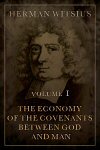
This is the first volume of what is considered to be Witsius’ most significant work. Ascribing to what is known as covenant theology, Witsius lays out the doctrinal value of covenant throughout the Scriptures in The Economy of the Covenants Between God and Man, Vol. 1. He discusses at length the covenant of works in the Old Testament, providing valuable commentary on the significance of the laws. Witsius then presents the covenant of grace as described in the New Testament. He compares and contrasts it with the Old Testament emphasis on works, showing how Christ’s sacrifice satisfied the demands of Old Testament law.
Table of Contents
- Dedication to William III
- A Pacific Address to the Very Reverend, Learned, and Celebrated Professors of Divinity in the Universities of the United Provinces of Holland; Pastors of the Reformed Churches, and Zealous Defenders of the Faith Once Delivered to the Saints
- The Life of the Author
- Of the Divine Covenants in General
- Of the Contracting Parties in the Covenant of Works
- Of the Law, or Condition, of the Covenant of Works
- Of the Promises of the Covenant of Works
- Of the Penal Sanction
- Of the Sacraments of Works
- Of the First Sabbath
- Of the Violation of the Covenant of Works on the Part of Man
- Of the Abrogation of the Covenant of Works on the Part of God
- Of the Covenant of Grace
- Of the Covenant between God the Father and the Son
- The Nature of the Covenant between the Father and the Son, More Fully Explained
- Of the Person of Surety
- Of the Suretiship and Sanctification of Christ
- What Sufferings of Christ are Necessary
- Of the Efficacy of Christ’s Satisfaction
- Of the Necessity of Christ’s Satisfaction
- Of the Persons for Whom Christ Engaged and Satisfied
- After What Manner Christ Used the Sacraments
- Of the Covenant of God with the Elect
- Of the Oneness of the Covenant of Grace, as to its Substance
- Of the Different Economies or Dispensations of the Covenant of Grace
- Of Election
- Of Effectual Calling
- Of Regeneration
- Of Faith
- Of Justification
- Of Spiritual Peace
- Of Adoption
- Of the Spirit of Adoption
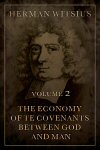
In this second volume, Witsius focuses on the elements of grace and salvation shown in the Old Testament, while still showing how Christ is the fulfillment of the law and the instigator of a new covenant of grace. He provides invaluable insight on the Old Testament, putting it into context with the New Testament and giving a holistic view of the entire Bible. By discussing the different types of sacraments in conjunction with the idea of covenant, the reader will have a better understanding of how this theme runs throughout Scripture.
Table of Contents
- Of Sanctification
- Of Conservation
- Of Glorification
- Of the Doctrine of Salvation in the First Age of the World
- Of the Doctrine of Grace Under Noah
- Of the Doctrine of Grace from Abraham to Moses
- Of the Decalogue
- Of the Doctrine of the Prophets
- Of the Types
- Of the Sacraments of Grace down to Abraham
- Of Circumcision
- Of the Passover
- Of the Extraordinary Sacraments in the Wilderness
- Of the Blessings of the Old Testament
- Of the Imperfections Falsely Ascribed to the Old Testament
- Of the Real Defects of the Old Testament
- Of the Abrogation of the Old Testament
- Of the Benefits of the New Testament
- Of Baptism
- Of the Lord’s Supper
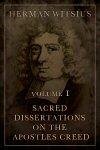
Originally written in Latin, this translation contains Witsius’ invaluable commentary on the Apostles’ Creed. Including a memoir, dedication, and two prefaces, Witsius presents a clear and concise history of this creed that has helped to define Christianity for centuries. While recognizing the importance of the Apostles’ Creed, Witsius also examines the theological accuracy of the doctrines contained in the creed. Using Scripture as a lens, Witsius lends great understanding and insight into this pillar of the Christian faith. This edition also has a detailed table of contents which will help to guide the reader through this massive volume.
Table of Contents
- Translator’s Preface
- Memoir of Witsius
- The Author’s Dedication
- The Author’s Preface
- On the Authors, and the Authority of the Apostle’s Creed
- On Fundamental Articles
- Of Saving Faith
- Of the Faith of the Existence of God
- On Faith in God
- On Faith in a Three-One God
- Of Faith in God the Father
- On the Creation
- On the Name Jesus
- On the Name Christ
- On the Name Christians
- On Jesus Christ, the Only-Begotten Son of God
- On Jesus Christ, Our Lord
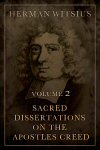
Witsius finishes his observations on the Apostles Creed in this second volume of Sacred Dissertations on the Apostles’ Creed, Vol. 2. Focusing on the character of Christ and His earthly life, His death and resurrection, Witsius also discusses the Holy Spirit and the position of the Church in the world. He also remarks on forgiveness and eternal life. This volume is essential to understanding the ramification and fullness of the Apostles’ Creed.
Table of Contents
- On Jesus Christ, Conceived of the Holy Ghost, and Born of the Virgin Mary
- On Christ’s Suffering Under Pontius Pilate
- On the Crucifixion and Death of Christ
- On the Burial of Christ
- On Christ’s Descent into Hell
- On the Resurrection of Christ
- On Christ’s Ascension into Heaven
- On Christ’s Sitting at the Right Hand of God the Father
- On Christ’s Coming Again to Judgment
- On the Holy Ghost
- On the Church, and the Communion of Saints, and the Operation of Our Faith with Regard to Both
- On the Forgiveness of Sins
- On the Resurrection of the Body, and the Life Everlasting
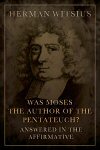
Witsius called this succinct volume “the apologetics of the Pentateuch.” In the late 1600s, there was much discussion and dissension on the authorship and validity of the first five books of the Old Testament. Witsius joins the dialogue with Was Moses the Author of the Pentateuch? Answered in the Affirmative. In it, he outlines the history and evidence for Moses as the author of the Pentateuch, addressing such topics as objections to Moses being the author, the character of Moses, examination of various Scripture passages, and evidence found in the New Testament. He also mentions the observations of other philosophers on this subject, such as Spinoza and Hobbes.
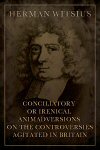
Are Christians under law? Under grace? Are Christians still under a moral law? Witsius addresses these doctrinal concerns that were raging all over Europe at this time about the nature of law, grace, and the role of the believer. He takes a close look at sin, how Christ justifies the believer, redemption, and the covenant of grace. Witsius discusses, in-depth, the nature of holiness, which, he observes, is the goal of grace and the gospel. This edition also includes cross-references throughout the text.
Table of Contents
- Concerning the Translation of Sin to Christ
- Whether Christ Can with Propriety be Called a Sinner, and Whether a Certain Exchange of Persons Takes Place Between Him and the Elect
- Whether the Translation of Sin to Christ, and His Bearing it Commenced and Ended: And Whether, when Carrying the Sins of the Elect, He was Separated from God, Abominable to Him, and Abdicated by Him
- Whether by Christ Taking Upon Him the Sins of the Elect, and Satisfying Divine Justice, Absolutely Purchased Eternal Salvation for Them
- Whether the Right the Eternal Inheritance be Applied to the Elect, at their First Nativity, or at Their Regeneration. And Whether God Imputes No More in Point of Guilt to an Elect Person When Living in Excessive Lasciviousness than When He is Perfected in the Heavens
- Whether the Elect are United to Christ Before Faith, and Whether, Not Only the Fruits of His Righteousness, but Also Itself is Imputed to Them
- Concerning Paul’s Judgment in the Matter of Justification
- Concerning the Law of Works, the Works of the Law, and Faith
- Concerning the Essence of Faith
- What Relation Faith has to Justification
- Whether Repentance Precedes the Remissions of Sins
- The Explication of Certain Paradoxes
- Our Judgment Concerning These Paradoxes
- Concerning the Covenant of Grace
- Paradoxical Assertions Concerning the Utility of Holiness
- The Doctrine of Scripture Concerning the Utility of Holiness
- In What Manner and Order the Preaching of the Law Should Accompany that of the Gospel
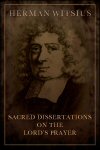
Witsius explores the significance and usage of the Lord’s Prayer in this exposition. First of all, he examines the definition and history of prayer throughout the Old Testament. He then moves on to the practical and spiritual advantages of prayer, as well as motivations and physical aspects of prayer. Witsius finishes this volume with a thorough inspection of each line of the Lord’s Prayer, providing a helpful analysis and commentary of this revolutionary prayer of Christ.
Table of Contents
- Translator’s Preface
- Author’s Dedication
- On Prayer
- On the Advantage and Necessity of Prayer
- On the Preparation of the Mind for Right Prayer
- On Gestures in Prayer
- On Stated Hours of Prayer
- On Petitions which We Ought to Present to God, A Summary of Which is Contained in the Lord’s Prayer
- One the Address to Our Heavenly Father
- On Hallowing the Name of God
- On the Coming of the Kingdom of God
- On Doing the Will of God
- On Daily Bread
- On the Forgiveness of Debts
- On Leading into Temptation
- On the Conclusion of the Lord’s Prayer

In this slim yet profound volume, Witsius presents his research on the reinstatement of the Jewish people in the kingdom of God. Witsius focuses on several passages from the New Testament testifying to the complete reconciliation of God’s chosen people to Himself. He also includes several Old Testament references. Witsius makes his arguments in a logical fashion, presented in a point-by-point format.
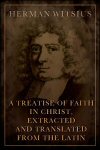
Divided into thirty-three succinct sections, this is Witsius’ careful examination of the doctrine of faith. In only forty pages, Witsius provides a solid and practical basis for understanding of faith in daily life for believers. He goes into detail about various acts of faith for the Christian, such as desiring truth and thirsting after Christ.

In this short work, Witsius explains the controversy surrounding reason and logic in religion. He clearly introduces some foundational issues, such as the definition of reason and how it is used to determine truth and reality. Witsius goes on from there to discuss its place in religion and how believers relate to God and spiritual matters. Separated into thirty-four concise paragraphs, Witsius uses Scripture and deductive reasoning to provide understanding of reason in the life of a believer.
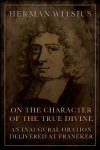
Witsius covers what makes a Divine, or a faithful and knowledgeable Christian, in this short yet valuable exposition. He addresses what it means for various stages of life, such as student and teacher. Witsius conveys the practical and spiritual aspects of what it means to follow Christ.
Herman Witsius was born in 1636 in Holland. He became a pastor in 1656 and a professor of divinity in 1675. The author of several theological books, Witsius died in 1708.
Reviews
3 ratings
Jason Guenther
3/27/2019

Mr. Youngblood
3/26/2016

Debra W Bouey
2/25/2016